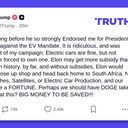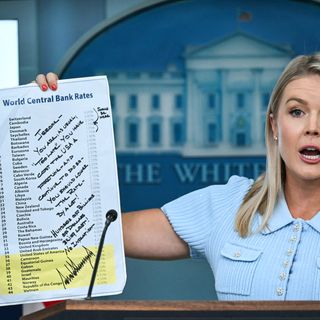Trump's clean-energy grenade rattles high-tech industries
Republicans in Congress are on the verge of knee-capping America's renewable energy boom, prompting urgent 11th-hour warnings from climate analysts, China hawks and industry titans like Elon Musk.
Why it matters: Critics say President Trump's megabill amounts to an abject surrender in the battle for the future of energy. The consequences for U.S. jobs, electricity prices and the AI arms race could reverberate for decades.
- The "One, Big, Beautiful Bill Act," which would gut key Biden-era clean energy subsidies and potentially impose new taxes on solar and wind projects, could reach Trump's desk as soon as this week.
- "A massive strategic error is being made right now to damage solar/battery that will leave America extremely vulnerable in the future," Musk tweeted Sunday, after the Senate unveiled new changes to the bill.
Threat level: Jason Bordoff, who leads Columbia University's energy think tank, said the bill could hinder the U.S. in the AI race with China.
- "Winning that race is going to require that we increase electricity generation capacity in the U.S. really fast — and by a lot," he told Axios.
- That soaring demand is creating tailwinds for natural gas and nuclear, but even those "great" sources can't ramp up fast enough to meet the urgent near-term needs of data centers and AI infrastructure, Bordoff said.
"We need all the tools in the toolkit to meet rapidly rising electricity demand very quickly to win a competitive race with China for leadership in AI, and this bill makes that harder by throwing sand in the gear to renewable energy," he argued.
The big picture: Trump has made "unleashing American energy" a pillar of his second-term agenda, casting it as central to both fighting inflation and powering the AI revolution's insatiable power demands.
- But his signature bill threatens to undercut that mission by targeting renewable energy sectors capable of delivering fast, scalable and affordable power.
Between the lines: Trump has long favored fossil fuels, and he made clear on the campaign trail that he would reverse as much of President Biden's climate legacy as possible.
- But Trump's hostility toward clean energy is also rooted in misinformation about the reliability of wind and solar — not to mention aesthetics.
What they're saying: In an interview with Fox News on Sunday, Trump called solar panels "ugly as hell," dismissed wind turbines as destructive, and praised coal as "clean, beautiful" and "very powerful."
- Many Republicans say the government should prioritize energy sources that can run around the clock — like nuclear and gas — instead of intermittently, like wind and solar.
- They also say the Inflation Reduction Act and other Biden-era energy policies showered wasteful subsidies on politically favored industries, distorting the market and overreaching on climate.
What to watch: Critics and clean-energy analysts warn the policies in the GOP bill could ripple across industries, supply chains and geopolitical fault lines.
- Growth in solar, wind, electric vehicle sales, and clean tech manufacturing will likely decelerate, as investment stalls and incentives disappear.
- Tech companies will face fresh challenges meeting AI's voracious energy needs, especially as supply chains for gas-fired turbines remain backlogged into the 2030s.
- Power prices may rise, with new projects delayed just as U.S. electricity demand climbs for the first time in 15 years. Wind, solar and batteries make up roughly 95% of the projects proposed to connect to the grid.
- China could widen its lead in low-carbon energy sectors that are becoming increasingly central to global power and competitiveness, even as the U.S. retreats on climate change.
Friction point: Several GOP senators led by Sen. Joni Ernst and Lisa Murkowski are negotiating to soften the bill slightly, especially by stripping out new taxes on wind and solar projects. But their amendment has not yet received a vote.
Zoom in: Analysts who support low-carbon energy warn of dire economic consequences if either the Senate or House versions of the GOP budget bill become law.
- New analysis from the think tank Energy Innovation projects that wholesale power prices would rise 19% by 2030 and 61% by 2035 under the Senate plan.
- Gas-fired power can't meet the explosive growth in electricity demand driven by AI and data centers, the group warns. Job losses could soar into the hundreds of thousands if clean energy investments collapse.
State of play: As it stands, the Senate bill would quickly remove $7,500 consumer tax credits for buying electric cars, as well as credits for large wind and solar projects that aren't connected to the power grid by 2028.
Other provisions in the Senate bill include:
- A near-immediate end to credits for residential efficiency and renewables projects.
- A quicker sunset of credits for producing low-emissions hydrogen, with projects now facing a Jan. 1, 2028, deadline to start construction.
- New restrictions barring access to various clean energy credits for projects with corporate or supply chain ties to China.
The House GOP version similarly pares back subsidies in the Democrats' 2022 climate law and beyond, though the measures are not identical.
- The bills take a selective approach to low-carbon energy, leaving support for nuclear, carbon capture, geothermal and some other tech largely intact.
The bottom line: Bordoff, an Obama-era White House energy and climate aide, warned the "pendulum will swing back" on climate change — and the U.S. risks falling behind when it does.
Daniel Moore and Katie Fehrenbacher contributed reporting.





















